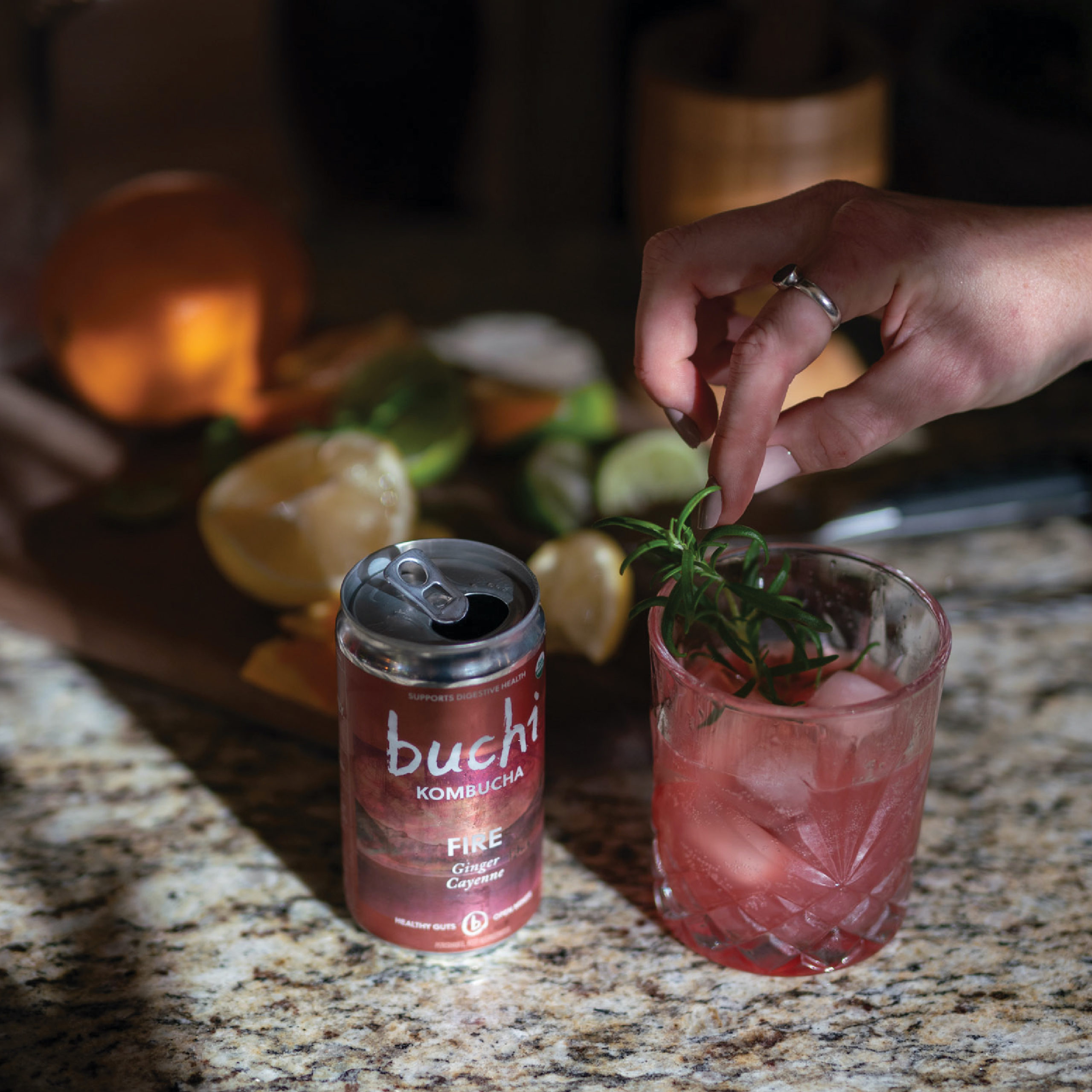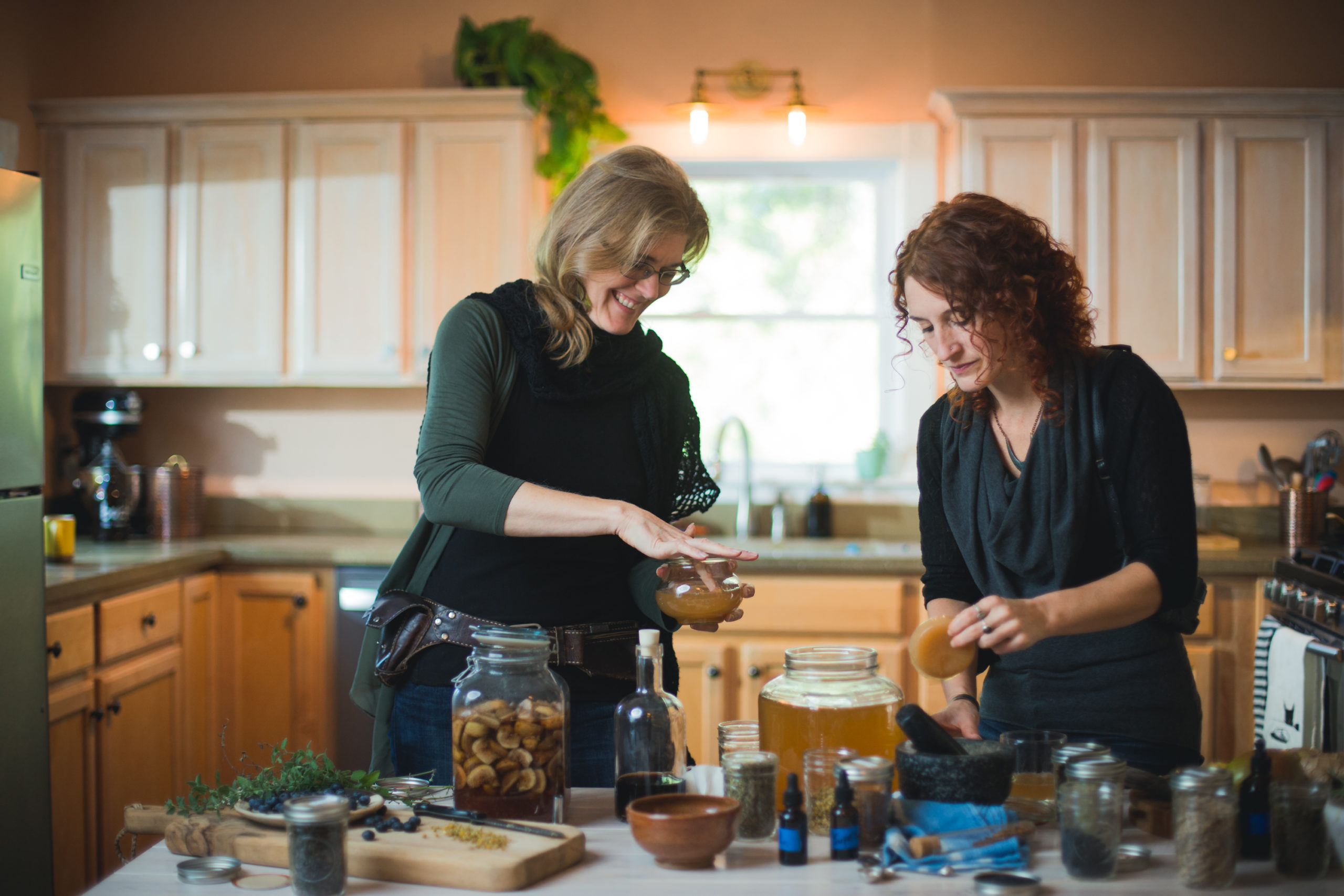A new type of fizzy drink has cemented its place on grocery store shelves around the country. Kombucha, a fermented tea drink with origins dating back to around 220 B.C. in China, has become a widely known product in recent years. Kombucha’s rising popularity in the United States is no surprise to Jeannine Buscher, co-founder of Buchi Kombucha, who has been brewing her own kombucha for almost 20 years. Through Buchi Kombucha, Buscher and the two other co-founders, Sarah Schomber and Zane Adams, are providing overlooked communities with access to a product with benefits for not only their health but also the wellbeing of our planet.
Where did the idea for Buchi originate from?
I had been brewing kombucha for my family and friends in Texas since 2004. When I moved to Asheville, NC with my husband and son, I was enthralled with the local food movement and went to every farmer’s market. I noticed kombucha flying off of the shelf at the local natural food store and so decided that I should make a little more kombucha and sell it at the farmers market. I set a date for our home to be inspected for approval to make kombucha out of my home and sell it commercially. Shortly after, I met Sarah at our kid’s homeschool coop and she had been making kombucha for a few years as well and wanted to start a business with another mom. So she asked if we should do it together — I said yes!

Can you describe your brand’s purpose or goal?
The goal was to provide a healthy nutrient-dense beverage to our community and to use business as a force for good.
What were you doing before starting your business? Was entrepreneurship something either of you had been interested in prior to starting Buchi?
We both have a bit of an entrepreneurial spirit. I had thought I would start a Montessori school when I moved to Asheville. Sarah was making meade and honing her permaculture skills.
When did you finally decide to take the leap and fully commit yourselves to Buchi?
It was really many, many baby steps — In 2010 we needed to move out of the shared use commercial kitchen and so we had to take on our first loan to outfit a kombucha brewery and purchase equipment.
What challenges did you face when trying to start Buchi?
Not enough money, not enough knowledge — Neither Sarah nor I had experience running a business or doing food manufacturing. Luckily my husband was an engineer and this helped us immensely. We had saved up some money before moving to Asheville which allowed us to get started. We had several consultants laugh at us to think we could start a beverage company with so little money.
Can you explain some of the health benefits behind Kombucha and Kefir Soda?
Functional fermented foods including kombucha, kefir, tibicos, kimchi, kraut and so many indigenous foods are building blocks that support long-term immunity, function, and wellbeing. Each contains various inputs like pre, pro or postiotics, detoxifying acids, and digestive enzymes that work within the collective of your microbiome. Each important but really they get their strength in numbers – out of many comes one. They are collectively linked to your overall approach to health. There are no silver bullets.
Your brand seems to have a strong focus on sustainability and ethics. Can you explain how you work to make your supply chain sustainable and ethical?
From the onset of our business, we prioritized resilient and regenerative sourcing when at all possible. We believe that when you build a foundation based on values that celebrate quality, nature, and those who grow those inputs, it nurtures a relationship that benefits all. In the face of astronomical freight costs causing non-stop price increases, we could have given up a number of high-quality, socially and environmentally progressive supplier situations, like our tea and sugar and ginger, in favor of cheaper ingredients with no impact for good. We didn’t.
How is Buchi addressing food scarcity?
We believe that access is the greatest obstacle to addressing scarcity, equity, and long-term resilience. We thoughtfully chose to pivot to a private label first organization by launching our holding company FedUp Foods as a Benefit corporation. Buchi, the brand, works in service of a greater mission of providing accessible (more affordable) nutrient-dense food in places that are often forgotten about in our food system — rural and urban communities that struggle to stock real food at prices people can afford. We believe that private labels offer the scale and quality that, if thoughtfully deployed, can reshape how we grow and buy better-for-you foods across the globe.
What are the different types of drinks that you sell?
Buchi has 6 flavors of kombucha and 4 skus of Kefir Soda. Each can of Buchi delivers fruit-forward, botanical-based goodness with a tangy taste, gentle sweetness, and effervescent bubbles to delight your senses. Some of our signature flavors are SEED (Coconut, Pineapple, Turmeric), LEGACY (Orange, Mango, Sea Buckthorn) SOVEREIGN (peach, ginger, molasses), WATER (Coconut, Blueberry, Elderberry), FIRE (Ginger, Cayenne) and SUMMIT (Lemon, Lime, Echinacea).
Where can customers purchase your product?
Buchi can be found primarily in the Southeastern US in Publix, Whole Foods, Earth Fare, Ingles and many other smaller retailers. We also offer Buchi through our website where customers can subscribe to regular deliveries of the product we manufacture.
What has been the most rewarding part of starting Buchi?
Learning that community is not an ideal or destination, it is a committed process that requires accountability from all.
Do you have any future plans for growth or expanding the Buchi brand?
As we lean into the mission, we discover so much more that needs to be done — it’s infinite. While our physical bodies/mind may tire and transition, it is our goal that the mission continues to be nurtured and pursued by willing souls who feel called to serve in this space. The brand of Buchi and the work of FedUp Foods, is greater than one person or ego aspiration, it’s a dynamic collective that embraces and inspires everyone to be present in the preservation of our humanity, our home.
